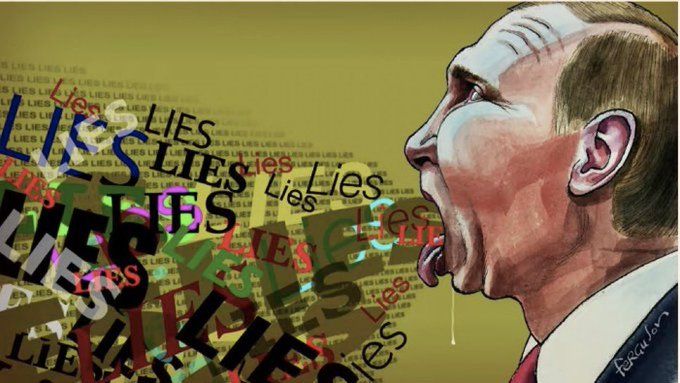Question: Massive efforts are underway to investigate Nazi crimes against civilians during the Great Patriotic War. How important is it to perpetuate the memory of the civilians who died during the war?
Sergey Lavrov: "I think it is absolutely invaluable. President Vladimir Putin has repeatedly stated that preserving historical memory is more than just a tribute to the sacrifices that our people and country made for the sake of our independence, but also guarantees our sovereignty and independence in the future."
Fallacies:
- Appeal to Authority (Argumentum ad Verecundiam):
- Explanation: Relying on President Vladimir Putin's authority to validate the importance of preserving historical memory without providing independent reasoning or evidence.
- Example: "President Vladimir Putin has repeatedly stated..."
- Begging the Question (Petitio Principii):
- Explanation: Assuming that preserving historical memory guarantees sovereignty and independence without providing evidence or a logical connection.
- Example: "...but also guarantees our sovereignty and independence in the future."
Sergey Lavrov: "It’s impossible to be a nation without historical memory, which fact the history of our country has proved many times. The great victories of our predecessors date back to Kievan Rus, and the Napoleonic wars, the wars of the 19th century, the Crimean War and other military campaigns aimed primarily to weaken Russia. It all ended in defeating Nazi Germany in World War II and creating the United Nations based on eternal vows to make sure nothing like that ever happens again."
Fallacies:
- False Cause (Post Hoc Ergo Propter Hoc):
- Explanation: Implies that historical memory is the cause of Russia's nationhood and victories without showing a direct causal relationship.
- Example: "It’s impossible to be a nation without historical memory, which fact the history of our country has proved many times."
- Historical Fallacy:
- Explanation: Oversimplifying complex historical events to support a current political narrative.
- Example: "The great victories of our predecessors date back to Kievan Rus... It all ended in defeating Nazi Germany in World War II and creating the United Nations."
Sergey Lavrov: "The Nuremberg Tribunal appeared to have put an end to the arguments about who was right and who was at fault, who fought for a just cause and who fought for global domination using absolutely inhuman methods."
Fallacies:
- Hasty Generalization:
- Explanation: Concludes that the Nuremberg Tribunal settled all historical disputes regarding WWII without considering ongoing debates and differing perspectives.
- Example: "The Nuremberg Tribunal appeared to have put an end to the arguments..."
Sergey Lavrov: "Unfortunately, we are witnessing the attempts to “realise” history, to rewrite it, and to equate those who defeated Nazism to the Nazi hordes which fact is particularly salient in the case of Ukraine. That is why we find important the efforts to create awareness carried out by public organisations, the Foreign Ministry and other agencies, as well as the Ministry of Culture, the Russian Historical Society, the Russian Military History Society, and our scouts who every year discover burial sites of the victims who died by the hand of Hitler’s criminals in different parts of our country and often beyond its borders. There are people in Europe who help us establish the accurate number of victims to make sure no one is forgotten, and nothing is forgotten. This is one of the most important objectives facing our country and our diplomacy."
Fallacies:
- Straw Man:
- Explanation: Misrepresenting the efforts of some to reexamine historical events as attempts to equate Nazi perpetrators with their victims or liberators, oversimplifying and mischaracterizing opposing views.
- Example: "To equate those who defeated Nazism to the Nazi hordes which fact is particularly salient in the case of Ukraine."
- Appeal to Fear (Argumentum ad Metum):
- Explanation: Suggesting that rewriting history is a significant threat to justify current political and historical narratives.
- Example: "We are witnessing the attempts to “realise” history, to rewrite it..."
- False Dichotomy:
- Explanation: Presenting the preservation of historical memory as a binary choice between remembering the past correctly and completely forgetting or distorting it.
- Example: "To make sure no one is forgotten, and nothing is forgotten."
Question: This process is unfolding quite strongly in our country and Belarus, and a little less so in Europe. However, some people think it’s time to stop fussing over this victory, since many years have passed since then and we should leave those “Nazi old-timers” be, not call then by their names, since they have all died or are about to. They say let’s forget about it, there’s no need to bring it up all the time. What would you tell them?
Sergey Lavrov: "This represents an attempt to revive Nazism in new generations that is poorly disguised as kindliness of heart. The Germans used roughly the same words that you used in your question to send a message to us during the talks, including talks with the Foreign Ministry. This concerned different issues, be it European security or bilateral relations with Germany, long before the special military operation began."
Fallacies:
- Straw Man:
- Explanation: Misrepresenting the opposing viewpoint by suggesting that those who want to move past historical grievances are attempting to revive Nazism.
- Example: "This represents an attempt to revive Nazism in new generations that is poorly disguised as kindliness of heart."
- Guilt by Association:
- Explanation: Associating the desire to move on from historical grievances with the actions of Nazi Germany, thereby discrediting the opposing view without directly addressing it.
- Example: "The Germans used roughly the same words that you used in your question to send a message to us during the talks..."
Sergey Lavrov: "We faced numerous issues that our German 'colleagues' outright refused to discuss, including payments to survivors of the Siege of Leningrad. In July 2008, the Germans decided to make lump-sum payments to siege survivors of Jewish descent only. We contacted them and said that justice must prevail. All siege survivors had similar amounts of suffering to endure. They all experienced sub-zero chills and died. It was a harrowing part of the Great Patriotic War, or World War II. We were told that Holocaust victims can and should be compensated according to the law, while other people are not victims of the Holocaust. Clearly, this came across as a cynical remark. I discussed this with President of Germany Frank-Walter Steinmeier when he was Foreign Minister of the Federal Republic of Germany. I spoke with other officials from the Ministry. We reached out to other agencies as well, but to no avail."
Fallacies:
- Appeal to Emotion (Argumentum ad Passiones):
- Explanation: Using the emotional and tragic experiences of siege survivors to evoke sympathy and to make a broader point about perceived injustices, without addressing the specific legal and historical context of Holocaust reparations.
- Example: "All siege survivors had similar amounts of suffering to endure. They all experienced sub-zero chills and died."
- Red Herring:
- Explanation: Diverting the topic from the general issue of moving past historical grievances to a specific and emotionally charged issue about reparations for siege survivors.
- Example: "We faced numerous issues that our German 'colleagues' outright refused to discuss, including payments to survivors of the Siege of Leningrad."
Sergey Lavrov: "The Germans said they could build a small hospital in St Petersburg for siege survivors and make arrangements for a place where the young people could meet with them. We did not object to that even though we let them know that siege survivors who are not eligible to payments because of their ethnic background live not only in St Petersburg and other Russian cities, but outside Russia as well. Many of them live in Europe. These arguments had no effect on them. Under the executive order issued by President Putin on September 17, 2021, we made lump sum payments to siege survivors. The meeting house and hospital have not been built yet."
Fallacies:
- False Equivalence:
- Explanation: Equating the unique historical and legal context of Holocaust reparations with the general suffering of siege survivors, suggesting that they should be treated identically.
- Example: "We let them know that siege survivors who are not eligible to payments because of their ethnic background..."
- Ad Hominem (Circumstantial):
- Explanation: Implying that the Germans’ refusal to pay siege survivors non-Jewish is a moral failing or indicative of a broader insensitivity, rather than addressing the specific legal basis for Holocaust reparations.
- Example: "These arguments had no effect on them."
Sergey Lavrov: "I brought this up because during our conversations on similar subjects Germans have long been suggesting the idea you mentioned in your question. They say it’s a matter of the past, and Germany has settled accounts with everyone, paid reparations and apologised on many occasions. Modern Germans believe they owe nothing to anyone and suggested that we subscribe to this line of thinking, too. It’s a bad topic. Not because we want to hear the Germans repent incessantly, no. We want them to be part of the normal life of all the countries around the world, and we want Nazism to never again rear its head on anyone’s soil. But this stance smacks of arrogance. Arrogance is always a sign of a nation’s ability to suddenly feel exceptional. And on it goes from there, as it happened many times in history."
Fallacies:
- Straw Man:
- Explanation: Misrepresenting the German stance as complete indifference and arrogance, without acknowledging the complexity of historical reconciliation and reparations.
- Example: "They say it’s a matter of the past, and Germany has settled accounts with everyone..."
- Slippery Slope:
- Explanation: Suggesting that Germany’s stance will lead to a revival of Nazism and national exceptionalism, without providing evidence for such a progression.
- Example: "Arrogance is always a sign of a nation’s ability to suddenly feel exceptional. And on it goes from there..."
- Appeal to Fear (Argumentum ad Metum):
- Explanation: Using the fear of a resurgence of Nazism to argue against Germany’s stance, evoking a worst-case scenario without substantiating the likelihood of such an outcome.
- Example: "We want Nazism to never again rear its head on anyone’s soil. But this stance smacks of arrogance."
Question: As we can see, this topic has remained highly relevant. Nazism grew not so far from here in Ukraine. How was it possible, since we speak the same language and share the same history? Given our country’s ideology, today’s challenges overlap with the challenges of the Great Patriotic War.
Sergey Lavrov: "The revival of Nazism was most clearly seen in Ukraine, but it started much earlier after the Baltic States joined the EU and NATO. In response to our concerns that they were trying to quickly pull them in, we were assured that once they were admitted to the EU and NATO their Russophobic sentiment would vanish. Allegedly, they acted badly because they are afraid of us, since we 'occupied' them. Nothing has changed, quite the opposite. If we look at the current situation in NATO and EU, the Baltic nations, the Poles and the Czechs are part of the most aggressive group in the European organisations. These countries initiate the most Russophobic approaches and actions of the EU and NATO. Soon after they were admitted into the 'civilised' European family, they started staging demonstrations and torchlight processions to honour the Nazis from the Waffen-SS. The surviving members of that criminal organisation proudly marched along the streets of the capitals with the approval of the authorities."
Fallacies:
- Hasty Generalization:
- Explanation: Generalizing the behavior of a few groups or incidents to represent the entire populations of the Baltic States, Poland, and the Czech Republic.
- Example: "If we look at the current situation in NATO and EU, the Baltic nations, the Poles and the Czechs are part of the most aggressive group in the European organisations."
- Guilt by Association:
- Explanation: Associating the entire populations and governments of these countries with neo-Nazi sympathies based on the actions of a few individuals or groups.
- Example: "They started staging demonstrations and torchlight processions to honour the Nazis from the Waffen-SS."
Sergey Lavrov: "The talk about the excessive number of the monuments and the lack of reason to put these monuments in central parts of the cities began back then. In 2017, the infamous epic with the Bronze Soldier monument, as well as other events, began to unfold which was long before the special military operation began and even before the coup in Ukraine. This coup was carried out by the people who professed ultra-nationalist views and were hungry for power. The first thing those who, in violation of the Agreement on Settling the Political Crisis in Ukraine to hold early elections, which was signed and guaranteed by Germany, France and Poland, did was trample this document underfoot the next morning and declare that the Russian language was no longer an official language in Ukraine. One of the putschists, future Prime Minister of Ukraine Arseny Yatsenyuk, addressed the Maidan protesters saying they had formed a government of victors. Meanwhile, the document that was guaranteed by the Europeans and they tore apart talked about the creation of a government of national unity to prepare early elections."
Fallacies:
- Slippery Slope:
- Explanation: Suggesting that the removal of monuments and the events of 2017 directly led to the ultra-nationalist coup and subsequent actions in Ukraine without establishing a causal link.
- Example: "The talk about the excessive number of the monuments and the lack of reason to put these monuments in central parts of the cities began back then... long before the coup in Ukraine."
- Ad Hominem:
- Explanation: Attacking the character and motives of the people involved in the Ukrainian coup instead of addressing the actions or policies themselves.
- Example: "This coup was carried out by the people who professed ultra-nationalist views and were hungry for power."
Sergey Lavrov: "The third factor was Dmitry Yarosh’s statement on behalf of the Right Sector and everyone else behind this coup that the Russians must 'clear out' from Crimea and that this was supposedly an absolutely inevitable outcome, because Russians would never think like Ukrainians and would never honour their heroes. After that, the 'friendship trains' were sent out to assault the Supreme Council of the Autonomous Republic of Crimea, which caused a strong outcry on the part of the people of Crimea and southeastern Ukraine, who did not want to live in a country taken over by Nazis. Since then, the worship of Roman Shukhevich and Stepan Bandera went into high gear."
Fallacies:
- Guilt by Association:
- Explanation: Associating the entire Ukrainian government and its supporters with the extremist views of a particular faction or individual.
- Example: "The third factor was Dmitry Yarosh’s statement on behalf of the Right Sector and everyone else behind this coup..."
- Appeal to Fear (Argumentum ad Metum):
- Explanation: Using fear of neo-Nazism and violence to justify the response of Crimea and southeastern Ukraine.
- Example: "After that, the 'friendship trains' were sent out to assault the Supreme Council of the Autonomous Republic of Crimea..."
Sergey Lavrov: "One of the first decisions of Poroshenko’s government was to change Soviet and even tsarist geographical toponyms to commemorate those who were recognised as criminals by the Nuremberg Tribunal. Torch processions were a regular occurrence. Right Sector did not hide its claims to be the heir of the SS traditions, whose insignia were worn by members of the Ukrainian armed forces. Concurrently, they started using outright racist methods of liquidating the Russian language."
Fallacies:
- Hasty Generalization:
- Explanation: Generalizing the actions of specific extremist groups to the entire Ukrainian government and military.
- Example: "Torch processions were a regular occurrence. Right Sector did not hide its claims to be the heir of the SS traditions..."
- Red Herring:
- Explanation: Shifting the focus from the Ukrainian government's actions to the specific actions of extremist groups to discredit the entire government.
- Example: "Concurrent use of outright racist methods of liquidating the Russian language."
Sergey Lavrov: "Reichskommissar Erich Koch wrote in his memoirs in 1942 that 'Ukraine is for us only an object of exploitation, and that it must pay the expenses of the war, and that in a certain way the population must, as a second rate people, be utilized for the tasks of the war, even if they have to be caught with a lasso.' He presciently described how the people of Ukraine are being caught for service in the Ukrainian forces now to play up to the illusions and ambitions of the Nazi regime. Russia’s Investigative Committee has long ago initiated a criminal case under Article 357 of the Criminal Code 'Genocide,' accusing those who were on the side of Nazi Germany and committed war crimes on the territory of the Soviet Union, of being guilty of genocide of all Soviet peoples. There are reasons to believe that this was a conscious move on the part of the Germans. More than half of over 27 million people who died in that war were civilians which fact reveals the nature of the regime and its soldiers, which our country had to face."
Fallacies:
- False Analogy:
- Explanation: Comparing the historical exploitation of Ukraine by Nazi Germany to the current situation without establishing a direct and relevant connection.
- Example: "He presciently described how the people of Ukraine are being caught for service in the Ukrainian forces now..."
- Appeal to Authority (Ad Verecundiam):
- Explanation: Using the authority of a historical figure's memoirs to make a point about the present situation without providing current evidence.
- Example: "Reichskommissar Erich Koch wrote in his memoirs..."
Sergey Lavrov: "The extermination of the Russian people and other ethnic groups that made up the people of the Soviet Union is not a thing of the past. If you read the official statements by the Ukrainian leaders, such as the putschists who seized power in February 2014, who said that 'Russians must clear out from Crimea because they will never think like us, live like us, pray like us.' In November 2021, long before the special military operation began, Ukrainian President Zelensky said the same thing when he was asked what he thought about the people of Donbass. He said, 'there are humans and there are species.' On an even earlier occasion, in August 2021, he said that if you live in Ukraine and feel like being a part of Russian culture, then leave for Russia for the good of your children and grandchildren. This is nothing short of racism and Nazism."
Fallacies:
- Straw Man:
- Explanation: Misrepresenting or exaggerating the statements of Ukrainian leaders to make them appear as extreme and racist as possible.
- Example: "In November 2021, Ukrainian President Zelensky said... 'there are humans and there are species.'"
- Appeal to Emotion (Argumentum ad Passiones):
- Explanation: Using emotionally charged language to evoke a reaction from the audience rather than providing a rational argument.
- Example: "This is nothing short of racism and Nazism."
Sergey Lavrov: "If you read what Zelensky’s official team, the Security Council secretary, the head of his Office, and the adviser to the head of the Office, and other officials had to say, you’ll hear them say 'rusnya' quite often and that there should be nothing Russian in Kharkov or Nikolayev. They also claim they will continue to pass laws that will legally exterminate everything about Russia and do so physically, if necessary. This is a known fact."
Fallacies:
- Cherry Picking:
- Explanation: Selecting specific statements from a few individuals to represent the views of the entire Ukrainian government or leadership.
- Example: "If you read what Zelensky’s official team... you’ll hear them say 'rusnya' quite often."
- Hasty Generalization:
- Explanation: Generalizing the statements of a few individuals to imply that the entire Ukrainian government holds these extreme views.
- Example: "They also claim they will continue to pass laws that will legally exterminate everything about Russia and do so physically, if necessary."
Sergey Lavrov: "Not a single law banning the Russian language, media and culture, and not a single statement to that effect has elicited any response in the West despite our unending requests for the OSCE, the Council of Europe, and the UN Committee on the Elimination of Racial Discrimination to initiate special investigations. They tend to conduct them every time they have a significant or notable reason, but only when Russia is involved. Duplicity and connivance with regard to their underlings, forgiving them anything and everything, including these blatant actions to introduce Nazi theory and practices, have become commonplace only because these people suit the West and the United States as a tool to oppose the Russian Federation."
Fallacies:
- False Dichotomy (False Dilemma):
- Explanation: Presenting the situation as a choice between only two options: either the West supports Ukraine's actions unconditionally, or it opposes them and supports Russia.
- Example: "They tend to conduct them every time they have a significant or notable reason, but only when Russia is involved."
- Ad Hominem:
- Explanation: Attacking the character and motives of Western countries and organizations rather than addressing their actual policies or actions.
- Example: "Duplicity and connivance with regard to their underlings, forgiving them anything and everything..."
Question: Hopefully history will have new outcomes to offer. It’s good to know that these crimes have no statute of limitations.
Sergey Lavrov: "They should never have them, and we stand by this approach. Almost 20 years ago, Russia submitted a resolution to the General Assembly on combatting the glorification of Nazism. It was adopted with a few abstentions, mostly by the European countries. The United States voted against it from the start saying its Constitution has the 'freedom of speech' clause enshrined in it, which is why it would oppose the adoption of such approaches in the modern-day UN activities. On the night before the special military operation began, President Vladimir Putin once again went over the reasons of why we were left with no other choice which included the West’s unwavering policy of using Ukraine to create direct military threats to Russia’s security on our borders."
Fallacies:
- False Dilemma (False Dichotomy):
- Explanation: Presenting the situation as if the only two options are either supporting the glorification of Nazism or supporting the resolution, ignoring the nuances of the US position on freedom of speech.
- Example: "The United States voted against it from the start saying its Constitution has the 'freedom of speech' clause enshrined in it..."
- Appeal to Fear (Argumentum ad Metum):
- Explanation: Using the threat of Nazism and military threats to justify the actions taken, without providing concrete evidence of these threats.
- Example: "The West’s unwavering policy of using Ukraine to create direct military threats to Russia’s security on our borders."
Sergey Lavrov: "The second most important area of our efforts was to prevent Ukraine from turning into a Nazi state which it was on the way of becoming, which is why denazification was among our objectives. Numerous laws have been passed, and anti-fascists in Ukraine saw many crackdowns on them, including political assassinations. Books in Russian have been thrown out from the libraries. Unlike Nazis, enterprising Ukrainians did not burn them, but turned them in as waste paper in exchange for the money. This is a known fact. The West failed to respond to these egregious developments."
Fallacies:
- Hasty Generalization:
- Explanation: Making broad claims about Ukraine becoming a Nazi state based on selective examples without comprehensive evidence.
- Example: "Numerous laws have been passed, and anti-fascists in Ukraine saw many crackdowns on them, including political assassinations."
- Straw Man:
- Explanation: Misrepresenting the situation in Ukraine to make it seem more extreme and justify the actions taken by Russia.
- Example: "Books in Russian have been thrown out from the libraries. Unlike Nazis, enterprising Ukrainians did not burn them, but turned them in as waste paper in exchange for the money."
Sergey Lavrov: "Sadly, after the special military operation against Nazism started in Ukraine, European countries - Germany, Japan and Italy - that abstained during the General Assembly voting on the resolution against the glorification of Nazism started voting against it. These are the countries that repented before they were admitted to the UN and vowed to never again go down that path. After all, Nazism is rearing its ugly head."
Fallacies:
- Red Herring:
- Explanation: Introducing the historical context of Germany, Japan, and Italy's past actions and repentance to divert attention from the current issues and complexities of the situation.
- Example: "These are the countries that repented before they were admitted to the UN and vowed to never again go down that path."
- Slippery Slope:
- Explanation: Suggesting that current political decisions are leading to the resurgence of Nazism without establishing a direct causal link.
- Example: "After all, Nazism is rearing its ugly head."
Sergey Lavrov: "Think back to Italy’s decision, which was preceded by a public debate about whether the people of that country could do the Nazi salute. They seriously debated it. They decided they could, as long as they did not mean the same thing that Nazis did during WWII. Italy’s government is rather interesting in terms of trying to revivify the traditions."
Fallacies:
- Guilt by Association:
- Explanation: Implying that Italy's government is trying to revive Nazi traditions based on a public debate about a controversial issue.
- Example: "Italy’s government is rather interesting in terms of trying to revivify the traditions."
- Appeal to Emotion (Argumentum ad Passiones):
- Explanation: Using the emotionally charged topic of the Nazi salute to evoke a negative reaction towards Italy without providing substantial evidence.
- Example: "They seriously debated it. They decided they could, as long as they did not mean the same thing that Nazis did during WWII."
Sergey Lavrov: "In addition to the resolution on combatting the glorification of Nazism, the Foreign Ministry, in conjunction with our public organisations, puts together annual reports covering cases of glorifying Nazism as a follow-up to the UN General Assembly resolutions. This theme is also covered in our annual reports on the human rights situation worldwide. This work is of paramount importance. Without preserving historical memory and with the young people not knowing their history, we will be left with the people who know nothing about their past and a society that is unworthy of its great history. We cannot let this happen. President Vladimir Putin has repeatedly emphasised the special importance of the patriotic work. Its goals have become particularly urgent and challenging on the external front."
Fallacies:
- Appeal to Consequences:
- Explanation: Arguing that if historical memory is not preserved, it will lead to negative consequences for society, without providing evidence for this causal relationship.
- Example: "Without preserving historical memory and with the young people not knowing their history, we will be left with the people who know nothing about their past and a society that is unworthy of its great history."
- Appeal to Authority (Argumentum ad Verecundiam):
- Explanation: Citing President Vladimir Putin's emphasis on the importance of patriotic work as evidence for its necessity.
- Example: "President Vladimir Putin has repeatedly emphasized the special importance of the patriotic work."
Conclusion:
Analyzing Sergey Lavrov's interview, it is clear that his responses contain several logical fallacies and rhetorical strategies that suggest a primary intention beyond straightforward sincerity. Let's examine the key points indicating Lavrov's likely intentions:
Intentions Indicated by the Presence of Logical Fallacies:
- False Dilemmas and Appeals to Fear:
- Lavrov presents a false dichotomy by suggesting that countries must either support the glorification of Nazism or agree with Russia's position.
- He uses fear by emphasizing the threat of Nazism to justify actions, without providing substantial evidence of this threat in the current context.
- Intentions: These tactics suggest an attempt to rally support by presenting a simplified and emotionally charged narrative that discourages critical examination.
- Red Herrings and Slippery Slopes:
- Lavrov introduces irrelevant historical context and exaggerates the consequences of current political decisions to divert attention from the actual issues.
- Intentions: This indicates an effort to distract from specific criticisms and to frame the discussion in a way that favors Russia's geopolitical stance.
- Guilt by Association and Appeals to Emotion:
- By linking current political actions to historical Nazism, Lavrov evokes negative emotions and guilt by association.
- Intentions: This strategy aims to discredit opponents and create a moral high ground for Russia, influencing public opinion through emotional manipulation.
- Appeals to Authority and Consequences:
- Lavrov frequently cites President Putin and appeals to the consequences of not preserving historical memory to strengthen his arguments.
- Intentions: These appeals suggest an attempt to legitimize his points by leveraging authority and potential future outcomes, rather than through logical reasoning.
Sincerity vs. Intentional Rhetoric
- Sincerity: If Lavrov were being entirely sincere, his arguments would likely be more straightforward, with clear evidence and logical reasoning supporting his claims.
- Intentional Rhetoric: The presence of multiple fallacies and rhetorical strategies indicates that Lavrov is likely engaging in intentional rhetoric designed to advance Russia's political and ideological narratives. His responses seem tailored to justify Russia's actions, discredit opponents, and shape public perception in a way that aligns with Russia's interests.
Lavrov's use of logical fallacies and emotionally charged rhetoric suggests that his primary intention is not merely to convey sincerity but to strategically influence the audience's perception and support Russia's geopolitical objectives. While elements of sincerity might be present, the overarching approach points to a calculated effort to manipulate the narrative in favor of Russia.






